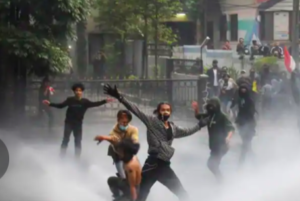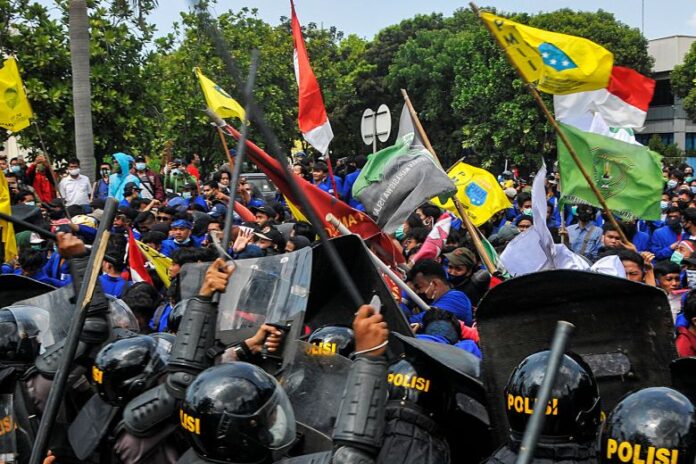In Indonesia, students and workers went on a massive strike protesting the new “job creation” omnibus bill that will weaken environmental protections and workers’ rights to favour investment. The bill was pushed through parliament with unprecedented speed and has been characterised as a “ruinous false choice”. Police forces since launched “cyber patrols” and fired tear gas and water canons at protestors.
Indonesian president, Joko Widodo claims that the Omnibus Bill, which is central to Widodo’s economy reforms, will promote investment and boost jobs. It was first introduced in October following re-election, with the promise of revising laws that obstruct job creation.
During his second term, the government and media put forth narratives which gave importance to economic growth and FDI to lend legitimacy to the Widodo government. As Trissiaoei writes:
What is the Omnibus Bill and why are people protesting it?
Mogok Nasional Buruh-buruh Serang. PT PWI 1. pic.twitter.com/VCZwGlJ6yw
— twitpos™ (@twitpos) October 6, 2020
“Job Creating” Omnibus Bill
There are at least three sets of Omnibus Bills that are/will be introduced this year:Job Creation, Taxation, and New Capital City. All three aim to increase liberalisation by making markets more flexible to foreign investment. Of these, workers are currently protesting the Job Creation Bill, though the controversial taxation bill was also introduced yesterday.
The bill will revoke around 26 articles on buildings including those of building permits and licenses, building ownership status, licenses for land rights, safety, structural requirements, protection against fire and lightning strikes along with requirements for health, air lighting, sanitation, building materials, etc.
The bill will simplify the business license procedure across all business sectors including agriculture, security, military and defence, trade, energy, telecommunications, among others. Regulations for foreign investors will also be removed, and instead certain businesses are prohibited for both domestic and foreign companies.
Labour “reforms” will scrap severance payments, payments for recognition of length of service and compensation for rights. Article 93 that stipulates workers’ rights for paid leave of Foreign workers will also be allowed to work in Indonesia without a permit in upper level and management positions. Outsourcing requirements will be significantly relaxed, and institutions can even outsource full-time work. The industries will not have to adhere to regional minimum wages, and Article 93, which stipulates worker’s rights for paid leave under certain circumstances will be scrapped.
There will also be a stronger central government, and regional governments will be weakened.
Celebrities and influencers are promoting the same, but thousands of students, workers, academics and activists have deeply critiqued the bill as well as the way it was passed.
Workers Concerns
 Even though it claims to be creating jobs, the Omnibus Bill will make the workers’ situation even more dire. It legalises many of the ways in which corporates take advantage of vulnerable workers, and makes it impossible for them to take legal recourse against mistreatment.
Even though it claims to be creating jobs, the Omnibus Bill will make the workers’ situation even more dire. It legalises many of the ways in which corporates take advantage of vulnerable workers, and makes it impossible for them to take legal recourse against mistreatment.
“Easy hiring, easy firing” will empower big corporations to lay off workers for minuscule reasons, or even for demanding conditions that are not oppressive. Mass firings, which rose during COVID-19, will be institutionalised. The relaxation of outsourcing laws will also give them a pool of vulnerable workers to choose from, who have to work under precarious conditions, with unregulated hourly wages, and longer working days.
With the scrapping of paid leave, workers can also be overworked. This will also put workers who have to take days off under further risk of getting fired. This especially puts those who come from disenfranchised backgrounds and areas lacking in sanitation at further risk as they could fall sick and not be able to take the required rest.
All this would disempower workers unions and put their members at risk. In the case of the United States, for instance, workers are afraid of unionising for the danger of getting fired.
The bill also makes it easier for foreign nationals to be employed. This would make it more difficult for domestic employees to attain social mobility as companies can hire foreign workers at lower pay at both higher and lower levels. Immigrant workers at lower levels can more easily be exploited, because of which employers will also be less likely to employ domestic labour.
Environmental Concerns
The new Bills scrap the mandatory Environmental Impact Assessments especially for the so-called “low-risk business” category. Buying and selling land is also made much easier, as mentioned above, without any scrutiny at how the building materials are created, or how it will affect the people around.
The bill also simplifies business license procedures, making it easy for private corporations in environmentally draining sectors- such as energy, defence, agriculture, marine- to buy, steal and exploit land.
Combined, this will negatively impact “resource rich” protected zones such as indigenous lands, forests, remote islands, etc. Along with the recent mining law, this can be disastrous for pollution, and also accelerate displacement of the indigenous population.
State response to Omnibus protests






